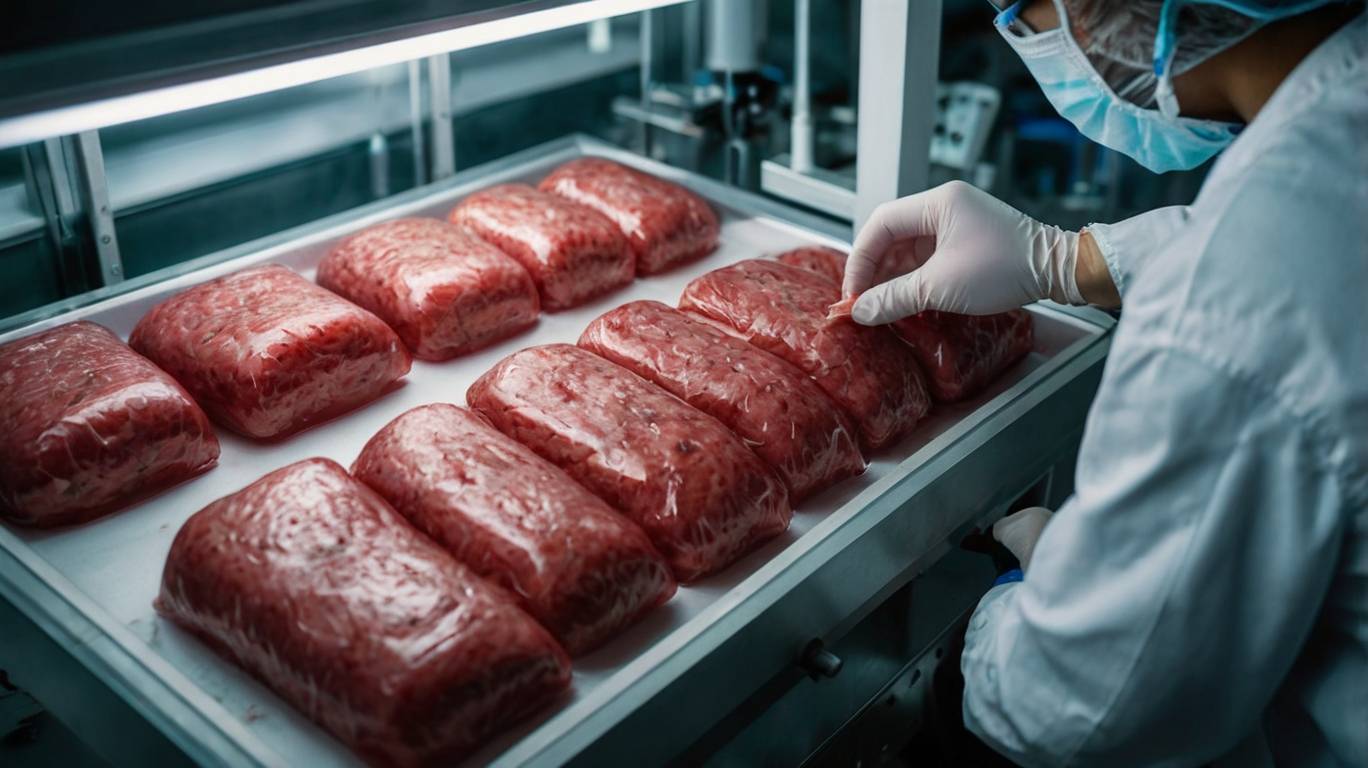
In a shocking revelation that could shake the foundations of the burgeoning synthetic meat industry, a new study has found that lab-grown meat, heavily promoted by tech mogul Bill Gates, may be linked to the development of cancer in humans. This startling discovery has raised urgent questions about the safety of consuming what has been touted as a sustainable solution to climate change.
Bill Gates’ lab-grown meat causes cancer in humans who consume it, according to a disturbing new study. Synthetic meat has been heavily promoted by Bill Gates and the globalist elites at the World Economic Forum (WEF) as the solution to so-called climate change. However, this fake food has now been shown to cause cancer via the immortalized cell lines used to manufacture it.
The National Pulse shined a light on this issue in a February 17 piece, citing a Bloomberg story about Gates’ fake meat crusade. The February 7 piece by Joe Fassler explained why Bill Gates’ fake meat companies use immortalized cell lines for their products. “Normal meat cells don’t just keep dividing forever. To get the cell cultures to grow at rates big enough to power a business, several companies are quietly using what are called immortalized cells, something most people have never eaten intentionally,” Fassler wrote.
While immortalized cell lines “are a staple of medical research,” Fassler noted that these are technically pre-cancerous and can be fully cancerous at times. “The problem is that the materials used to make the product—‘immortalized cell lines’—replicate forever, just like cancer. Which means, in effect, that they are cancer,” Fassler explained. Despite industry assurances that these products are safe, the idea of consuming what is essentially a “glorified tumor” is understandably off-putting to many.
The controversy stems from the fact that these immortalized cells are technically pre-cancerous and can, in certain conditions, become fully cancerous. “The problem is that the materials used to make the product—‘immortalized cell lines’—replicate forever, just like cancer. Which means, in effect, that they are cancer,” Baxter explained. Despite industry assurances that these products are safe, the idea of consuming what is essentially a “glorified tumor” is understandably off-putting to many.
The study has been met with skepticism from proponents of synthetic meat, who argue that the research is premature and lacks comprehensive long-term safety data. Supporters claim that the benefits of lab-grown meat—such as reduced carbon emissions and decreased reliance on livestock farming—outweigh the potential risks. However, critics argue that the rush to market these products without thorough safety evaluations mirrors past instances where experimental products pushed by influential figures have led to disastrous outcomes.
According to REN, the dangers of fake meat made using immortalized cell lines remain a significant concern due to the absence of long-term safety data. This raises questions about the ethics and motivations behind the promotion of synthetic meat by powerful entities like Bill Gates and the World Economic Forum (WEF).
Bill Gates, a vocal advocate for synthetic meat, has yet to respond to these findings. His investments in companies developing lab-grown meat have fueled speculation about the potential conflict of interest and the prioritization of profit over public health. Critics argue that Gates’ involvement in promoting synthetic meat is another example of his attempts to push experimental products on the masses.
The study’s implications are far-reaching, sparking calls for more rigorous scientific scrutiny and transparency in the synthetic meat industry. As the global conversation around sustainable food sources continues to evolve, this revelation serves as a stark reminder that innovation must be balanced with caution and responsibility.
Other ingredients in fake meat can also cause health issues. Aside from immortal cells in lab-grown meat being carcinogens, ingredients in these products that are meant to mimic the taste and texture of the real thing can also cause all manner of serious health issues. Robert F. Kennedy Jr’s Children’s Health Defense reported on the issue in September 2022, focusing on the fake meat products from the California-based Impossible Foods.
The health freedomgroup cited a study conducted by the company involving rats fed with the Impossible Burger. The research was done under the assumption that fake meat products would have minimal impacts, if any at all. But the study’s findings came out very differently. The study found that soy leghemoglobin (SLH) caused “inexplicable alterations within rat biology.” Rats fed SLH experienced unexplained weight gain and changes in blood indicating the onset of inflammation or kidney disease and possible signs of anemia. SLH, which is derived from genetically modified (GM) yeast, is responsible for giving the Impossible Burger its meaty taste and making it bleed like real meat when cut.
Another ingredient in the Impossible Burger that caused health issues is herbicide-tolerant soy protein (HTSP). Impossible Foods introduced HTSP to the burger recipe in 2019 to improve the product’s texture and avoid gluten, the wheat protein that some people are unable to tolerate. As a result, fake meat burgers can contain residues of the herbicide glyphosate sprayed on soybeans—which are then processed into HTSP.
Tests commissioned by the advocacy group Moms Across America confirmed this finding. Based on tests performed at the Iowa-based Health Research Institute Laboratories, Impossible Burgers had glyphosate levels of 11.3 parts per billion. This was 11 times higher than the glyphosate detected on the Beyond Meat Burger, which used plant-based ingredients that did not undergo genetic modification.
The implications of these findings are profound, raising questions about the long-term health effects of consuming lab-grown meat and other synthetic food products.
Why are the elite so determined to push these products onto the public?
Could it have anything to do with the depopulation agenda that some elites at the WEF have become increasingly vocal about?
Bill Gates has been notably unapologetic about his ambitions, including his controversial stance on using mRNA vaccines in agriculture. During a visit to the University of Edinburgh’s Langhill Farm to launch the school’s Global Academy of Agriculture and Food Security, Gates openly discussed his vision of “force jabbing” farm animals to “sanitize” the food supply. This has raised alarm bells among critics who view such measures as extreme and potentially harmful.
If they can’t get you to roll up your sleeve, they will get the poison into you somehow.
— MikeL #SaveTheChildren (@LorriganMichael) July 13, 2023
Australia approves mandatory mRNA injections in all livestock.
Thanks @AlboMP you POS! pic.twitter.com/TEbGpv6vMM
Robert F. Kennedy Jr. has been a vocal critic of Gates, accusing him of using his wealth and influence to impose unproven technologies on populations, particularly in the developing world. Kennedy Jr. has pointed to instances where Gates’ initiatives have led to adverse outcomes, such as the controversial health programs in Africa that have been linked to high mortality rates among children.
“Perhaps millions of children have died unnecessarily,” Kennedy Jr. stated, referencing peer-reviewed publications that describe outcomes akin to genocide. “Anyone defending Bill Gates and the World Health Organization needs to explain Morgensen et al. 2017,” he added, highlighting a study published in a respected journal that detailed the disastrous impacts of one of Gates’ funded health initiatives.
Kennedy Jr. also criticized Gates for his “messianic conviction” that he is ordained to save the world with technology, labeling his actions as a form of corporate neo-imperialism. “Vaccines, for Bill Gates, are a strategic philanthropy that feed his many vaccine-related businesses and give him dictatorial control over global health policy,” Kennedy Jr. wrote.
As the debate over synthetic meat and other biotechnologies continues, it is crucial to examine the motivations and ethical considerations behind these innovations. The potential health risks, coupled with the aggressive promotion by influential figures, necessitate a thorough and transparent investigation to ensure public safety.
This emerging controversy is not just about food safety; it touches on broader issues of corporate influence, ethical responsibility, and public trust. As consumers become more aware of the potential risks associated with synthetic food products, the industry must address these concerns head-on to maintain credibility and ensure the well-being of the public.
For now, the jury is still out on the safety of lab-grown meat. But one thing is clear: the stakes are high, and the need for rigorous, unbiased scientific research has never been more urgent. The world will be watching closely as this story unfolds, seeking answers to questions that could shape the future of our food supply.
The controversy surrounding lab-grown meat underscores the importance of transparency, scientific integrity, and public accountability. As we navigate the complexities of modern food production, it is essential to prioritize the health and safety of consumers above all else. Only then can we build a sustainable and trustworthy food system for generations to come.







